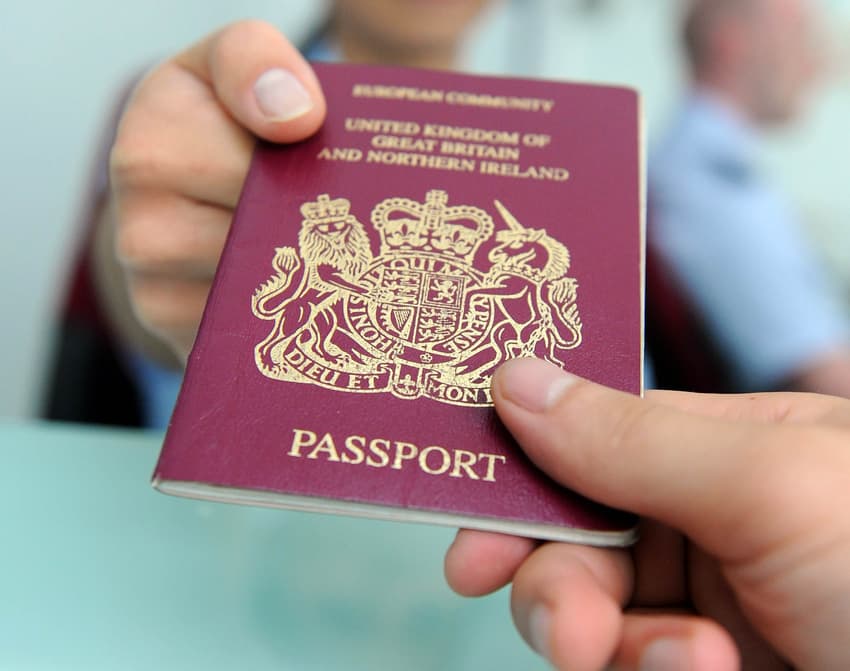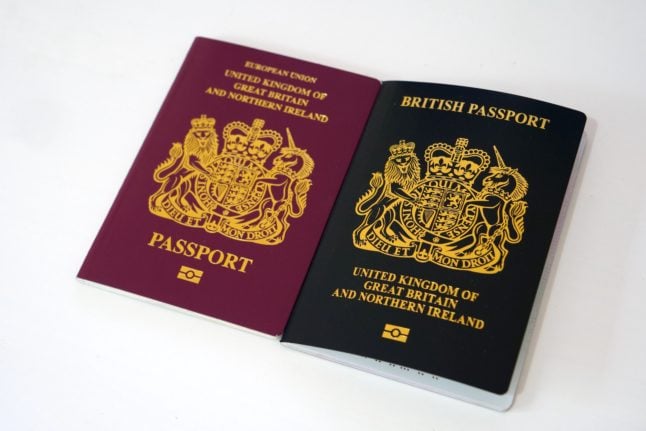Do Brits need to carry a residence permit at the German border after Brexit?

Whether you arrived before the Brexit cut-off date or moved to Germany more recently, you may be wondering if carrying your residence title or permit is necessary when entering or leaving the country. Here's what Brits need to know.
For many Brits living abroad in the EU, the past few years have been a steep learning curve. For the first time in a generation, they have to register for their residence rights or navigate the complicated immigration rules that are applied to third-country nationals, like applying for work or study visas.
This means that even Brits who have lived in Germany for years may end up encountering situations they haven't dealt with before, such as being asked for residence permits when applying for jobs or crossing the border in and out of Germany.
During Covid, this became particularly tricky, because people from non-EU countries generally had to prove their need to be in Germany before being allowed entry to the country.
But what are the rules in general for Brits when entering and leaving Germany? And is it necessary to always have a residence permit (Aufenthaltserlaubnis) or post-Brexit residence document (Aufenthaltsdokument-GB)?
Here's what you need to know.
What is the status of Brits in Germany after Brexit?
Since the transition period ended, UK citizens have been treated in much the same way as other non-EU citizens in Germany - albeit with a few more perks.
These include the right to visa-free travel in Germany (and the Schengen Area) for up to 90 days in every 180, the right to enter the country before applying for a visa and the ability to work for employers abroad while living in Germany.
In general, however, for people who didn't live in the country before the end of the Brexit transition period, the immigration requirements are much the same as they would be for someone from, for example, Japan or the USA.
In order to live in Germany long-term, Brits now need an appropriate residence permit, such as work, family reunification or study visa, or another status such as citizenship that assures their rights.
Otherwise, immigration authorities will enforce the so-called '90-day rule', meaning that Brits will be unable to spend more than three months out of every six in the Bundesrepublik.
READ ALSO: Reader question: Is my British residency title the same as permanent residency in Germany?
Which Brits have the right to live in Germany?
Brits who have a valid residence permit - such as a work or study visa - are entitled to live in Germany for the duration of their visa, and can normally choose to renew it or apply for a different visa once their permit expires.
Those who have German citizenship (i.e. British-German dual nationality) have lifelong residence rights in Germany, as do people with permanent residency and those covered by the post-Brexit Withdrawal Agreement (Article 50), provided they don't leave the country for too long.
UK citizens in Germany who exercised their free movement rights before December 31st, 2020, have a special status under Article 50. Ultimately, they have the right to remain in Germany indefinitely and enjoy much the same rights as EU citizens, such as being able to claim benefits and switch freely between employers or different kinds of work, for example.

A new UK passport design and old UK/EU passport design side by side. Photo by Ethan Wilkinson on Unsplash
These rights are essentially for life, though they can be lost if you spend too long away from Germany - and how long depends on when your card was issued. People who have lived in Germany for five years or more can get a Daueraufenthaltsdokument-GB (permanent residence document), which allows them to live outside of Germany for up to five years without losing their status.
Otherwise, you're issued with an ordinary Aufenthaltsdokument-GB, which allows you to live outside of Germany for up to six months - or one year in exceptional circumstances - without losing your rights.
READ ALSO: How long can you leave Germany for without losing permanent residency?
Do Brits covered by the Withdrawal Agreement need their residence card to cross the border?
This is a tricky question, and one that has been an issue since the get-go. After the transition period, many Brits had to wait months for their post-Brexit residence documents and were concerned about issues they may face while travelling during that time.
At the time, a spokesperson for the border police at Frankfurt am Main airport told The Local that other documents could be used by Brits to prove their residence (and residence rights) in Germany.
"If no application (for a residence document) has yet been submitted to the competent domestic office, the right of residence in the federal territory can also be proven by submitting suitable documents such as a tenancy agreement, employment contract, certificate of registration, etc.," they explained.
More recently, another spokeswoman confirmed that these more relaxed rules had been in place for six months after the end of the transitional period - i.e. until June 30th, 2021.

Police check ID documents at the German/Swiss border. Photo: picture alliance / dpa | Patrick Seeger
However, she said that Brits covered by the Withdrawal Agreement can still use other means to prove their residence in Germany - though this can be more complicated and time consuming.
"In the context of the border control it requires as described in principle the presentation of a residence title or residence document GB, however, the possibility of proving the right of residence after the withdrawal agreement in another suitable way still exists," she explained. "As a rule, however, for the purpose of this verification of other evidence, the second line of control must be brought in, which enormously increases the time required for the border control."
What's important to note is that Brits do have the right to stay in Germany for up to 90 days without a visa, so it's unlikely that you'd be turned away without your residence document.
Nevertheless, the British government advises Brits to always keep their residence card on them when entering or leaving Germany.
"When you travel, carry your residence document Aufenthaltsdokument-GB or frontier worker permit ‘Aufenthaltsdokument für Grenzgänger-GB’ issued under the Withdrawal Agreement, in addition to your valid passport," the official advice reads.
You must proactively show your residence document, or other evidence of residence status, if you are asked to show your passport at border control. If you have applied for, but not yet received, your Aufenthaltsdokument-GB, show your ‘Fiktionsbescheinigung’ certificate. If you cannot prove that you are a resident in Germany, you may be asked additional questions at the border to enter the EU.
Do Brits who live in Germany with a visa need their residence permit to enter and/or leave?
According to official advice from the Federal Police, foreigners are required to show their passport whenever they cross the German border, and should also be able to show a residence document if required.
That means that, where possible, it's important to have both with you if you are planning on leaving Germany for any amount of time.
As we mentioned, Brits are in general allowed to enter Germany without a visa.
According to recent stats, only 195 Brits were turned away at the EU border in 2022 due to the 90-day rule.
However, this is always a risk that you face if you don't have the required documents with you and, even if you are let in, you may have to deal with numerous questions beforehand and may even receive a passport stamp.
READ ALSO: How many travellers are turned away at European borders because of 90 day limit?
Can I still travel after my residence permit expires?
The short answer is yes - though it is a good idea to be proactive about renewing it.
In most cases, booking a visa appointment at the Foreigners' Office will automatically extend your visa until the date of your appointment, and you will be able to travel with what's known as a Fiktionsbescheinigung in the meantime.
For people who are waiting on a visa or a visa appointment, presenting a Fiktionsbescheinigung with the third box ticked should permit you entry into Germany. For those waiting on another post-Brexit residence document, a Fiktionsbescheinigung with the fourth box ticked is required.
"Although the aforementioned Fiktionsbescheinigung contains a time expiration date, it may, under certain circumstances, continue to be valid beyond the expiration date until the immigration authority has actually decided on the application," the spokesperson at Frankfurt Airport told The Local.
"In case of doubt, this circumstance would be verified within the framework of the border control by a short-term consultation with the responsible foreigners authority."

Automated border controls at Berlin airport. Photo: picture alliance / Bernd Settnik/dpa-Zentralbild/dpa | Bernd Settnik
Things are tiny bit simpler if your visa is in a passport that has expired.
In advice for third-country nationals, the German government explains: "Provided that the residence title for Germany has not been damaged by the invalidation of the old passport, you can usually enter Germany together with the old and the new passport without any problems. The same applies if you already have the electronic residence title (plastic card). The issuance of a visa for re-entry is not necessary in these cases."
However, they advise people to apply to get a new visa placed in their up-to-date passport or an up-to-date residence permit as soon as possible upon return.
What happens if border guards stamp my passport?
It can be a worry if long-term residents of the EU get a passport stamp when entering the Schengen area, but if you can prove your residence rights at a later date, there's no cause for concern.
According to the UK government, a passport stamp "will not affect your rights in the country or countries where you live or work". In fact, if you receive an accidental passport stamp at the border, "the stamp is considered null and void when you can show evidence of lawful residence".
Of course, different rules apply if you don't have residence rights and need to adhere to the 90-day rule, but if you are entitled to live in Germany, there shouldn't be an issue - even if you enter and leave through a neighbouring country.
READ ALSO: Does transit through Germany's neighbours affect Brexit 90-day rule?
Comments
See Also
For many Brits living abroad in the EU, the past few years have been a steep learning curve. For the first time in a generation, they have to register for their residence rights or navigate the complicated immigration rules that are applied to third-country nationals, like applying for work or study visas.
This means that even Brits who have lived in Germany for years may end up encountering situations they haven't dealt with before, such as being asked for residence permits when applying for jobs or crossing the border in and out of Germany.
During Covid, this became particularly tricky, because people from non-EU countries generally had to prove their need to be in Germany before being allowed entry to the country.
But what are the rules in general for Brits when entering and leaving Germany? And is it necessary to always have a residence permit (Aufenthaltserlaubnis) or post-Brexit residence document (Aufenthaltsdokument-GB)?
Here's what you need to know.
What is the status of Brits in Germany after Brexit?
Since the transition period ended, UK citizens have been treated in much the same way as other non-EU citizens in Germany - albeit with a few more perks.
These include the right to visa-free travel in Germany (and the Schengen Area) for up to 90 days in every 180, the right to enter the country before applying for a visa and the ability to work for employers abroad while living in Germany.
In general, however, for people who didn't live in the country before the end of the Brexit transition period, the immigration requirements are much the same as they would be for someone from, for example, Japan or the USA.
In order to live in Germany long-term, Brits now need an appropriate residence permit, such as work, family reunification or study visa, or another status such as citizenship that assures their rights.
Otherwise, immigration authorities will enforce the so-called '90-day rule', meaning that Brits will be unable to spend more than three months out of every six in the Bundesrepublik.
READ ALSO: Reader question: Is my British residency title the same as permanent residency in Germany?
Which Brits have the right to live in Germany?
Brits who have a valid residence permit - such as a work or study visa - are entitled to live in Germany for the duration of their visa, and can normally choose to renew it or apply for a different visa once their permit expires.
Those who have German citizenship (i.e. British-German dual nationality) have lifelong residence rights in Germany, as do people with permanent residency and those covered by the post-Brexit Withdrawal Agreement (Article 50), provided they don't leave the country for too long.
UK citizens in Germany who exercised their free movement rights before December 31st, 2020, have a special status under Article 50. Ultimately, they have the right to remain in Germany indefinitely and enjoy much the same rights as EU citizens, such as being able to claim benefits and switch freely between employers or different kinds of work, for example.

These rights are essentially for life, though they can be lost if you spend too long away from Germany - and how long depends on when your card was issued. People who have lived in Germany for five years or more can get a Daueraufenthaltsdokument-GB (permanent residence document), which allows them to live outside of Germany for up to five years without losing their status.
Otherwise, you're issued with an ordinary Aufenthaltsdokument-GB, which allows you to live outside of Germany for up to six months - or one year in exceptional circumstances - without losing your rights.
READ ALSO: How long can you leave Germany for without losing permanent residency?
Do Brits covered by the Withdrawal Agreement need their residence card to cross the border?
This is a tricky question, and one that has been an issue since the get-go. After the transition period, many Brits had to wait months for their post-Brexit residence documents and were concerned about issues they may face while travelling during that time.
At the time, a spokesperson for the border police at Frankfurt am Main airport told The Local that other documents could be used by Brits to prove their residence (and residence rights) in Germany.
"If no application (for a residence document) has yet been submitted to the competent domestic office, the right of residence in the federal territory can also be proven by submitting suitable documents such as a tenancy agreement, employment contract, certificate of registration, etc.," they explained.
More recently, another spokeswoman confirmed that these more relaxed rules had been in place for six months after the end of the transitional period - i.e. until June 30th, 2021.

However, she said that Brits covered by the Withdrawal Agreement can still use other means to prove their residence in Germany - though this can be more complicated and time consuming.
"In the context of the border control it requires as described in principle the presentation of a residence title or residence document GB, however, the possibility of proving the right of residence after the withdrawal agreement in another suitable way still exists," she explained. "As a rule, however, for the purpose of this verification of other evidence, the second line of control must be brought in, which enormously increases the time required for the border control."
What's important to note is that Brits do have the right to stay in Germany for up to 90 days without a visa, so it's unlikely that you'd be turned away without your residence document.
Nevertheless, the British government advises Brits to always keep their residence card on them when entering or leaving Germany.
"When you travel, carry your residence document Aufenthaltsdokument-GB or frontier worker permit ‘Aufenthaltsdokument für Grenzgänger-GB’ issued under the Withdrawal Agreement, in addition to your valid passport," the official advice reads.
You must proactively show your residence document, or other evidence of residence status, if you are asked to show your passport at border control. If you have applied for, but not yet received, your Aufenthaltsdokument-GB, show your ‘Fiktionsbescheinigung’ certificate. If you cannot prove that you are a resident in Germany, you may be asked additional questions at the border to enter the EU.
Do Brits who live in Germany with a visa need their residence permit to enter and/or leave?
According to official advice from the Federal Police, foreigners are required to show their passport whenever they cross the German border, and should also be able to show a residence document if required.
That means that, where possible, it's important to have both with you if you are planning on leaving Germany for any amount of time.
As we mentioned, Brits are in general allowed to enter Germany without a visa.
According to recent stats, only 195 Brits were turned away at the EU border in 2022 due to the 90-day rule.
However, this is always a risk that you face if you don't have the required documents with you and, even if you are let in, you may have to deal with numerous questions beforehand and may even receive a passport stamp.
READ ALSO: How many travellers are turned away at European borders because of 90 day limit?
Can I still travel after my residence permit expires?
The short answer is yes - though it is a good idea to be proactive about renewing it.
In most cases, booking a visa appointment at the Foreigners' Office will automatically extend your visa until the date of your appointment, and you will be able to travel with what's known as a Fiktionsbescheinigung in the meantime.
For people who are waiting on a visa or a visa appointment, presenting a Fiktionsbescheinigung with the third box ticked should permit you entry into Germany. For those waiting on another post-Brexit residence document, a Fiktionsbescheinigung with the fourth box ticked is required.
"Although the aforementioned Fiktionsbescheinigung contains a time expiration date, it may, under certain circumstances, continue to be valid beyond the expiration date until the immigration authority has actually decided on the application," the spokesperson at Frankfurt Airport told The Local.
"In case of doubt, this circumstance would be verified within the framework of the border control by a short-term consultation with the responsible foreigners authority."

Things are tiny bit simpler if your visa is in a passport that has expired.
In advice for third-country nationals, the German government explains: "Provided that the residence title for Germany has not been damaged by the invalidation of the old passport, you can usually enter Germany together with the old and the new passport without any problems. The same applies if you already have the electronic residence title (plastic card). The issuance of a visa for re-entry is not necessary in these cases."
However, they advise people to apply to get a new visa placed in their up-to-date passport or an up-to-date residence permit as soon as possible upon return.
What happens if border guards stamp my passport?
It can be a worry if long-term residents of the EU get a passport stamp when entering the Schengen area, but if you can prove your residence rights at a later date, there's no cause for concern.
According to the UK government, a passport stamp "will not affect your rights in the country or countries where you live or work". In fact, if you receive an accidental passport stamp at the border, "the stamp is considered null and void when you can show evidence of lawful residence".
Of course, different rules apply if you don't have residence rights and need to adhere to the 90-day rule, but if you are entitled to live in Germany, there shouldn't be an issue - even if you enter and leave through a neighbouring country.
READ ALSO: Does transit through Germany's neighbours affect Brexit 90-day rule?
Join the conversation in our comments section below. Share your own views and experience and if you have a question or suggestion for our journalists then email us at [email protected].
Please keep comments civil, constructive and on topic – and make sure to read our terms of use before getting involved.
Please log in here to leave a comment.